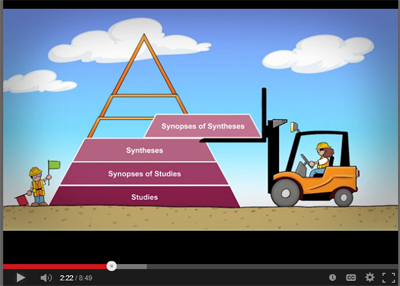January 2015 · Issue 114
In this issue:
- A closer look at NCCMTs video series: Understanding Research Evidence
- Register now for Spotlight on KT Methods and Tools webinar
- Register now for Evidence-Informed Decision Making workshop
A closer look at NCCMTs video series: Understanding Research Evidence
This week: 6S Pyramid: a tool that helps you find evidence quickly and efficiently
Remember, we created these short videos to explain some important terms that you may encounter in research evidence. They provide a valuable refresher or useful introduction to terms public health professionals need to make good decisions using research evidence.
One of the key activities of evidence-informed public health is conducting an effective and efficient search for research evidence to answer your practice-based question. However, searching for research evidence can be a daunting task. Relatively few public health professionals look forward to this activity. But this new video may give you a new perspective on searching.
6S Pyramid: a tool that helps you find evidence quickly and efficiently explains how using a structured process can save you time.
The 6S Pyramid provides a framework to structure our search for evidence. It provides us with a map, showing us where to start our search and where to go next to find what we are looking for. Whether you have a librarian who conducts searches for you, or you do them yourself, the 6s pyramid is a helpful guide.
By starting at the top of the Pyramid, you always look for the most highly synthesized evidence first and only look for less synthesized evidence when nothing is found at the higher levels. This strategy can significantly reduce the time it takes to find the research evidence you need to answer your practice question.
About the series
The Understanding Research Evidence series now includes ten short videos which explain key statistical terms, including: odds ratios, relative risk, confidence intervals, forest plots, clinical significance, types of reviews, p value, evidence-informed decision making and number needed to treat. The videos explain each term in plain language using realistic public health examples and engaging visuals.
Watch all the videos in the series!
The videos are available on YouTube and on the NCCMT website (http://www.nccmt.ca/resources/multimedia-eng.html). They are part of a series of products and services on the website and in the Learning Centre (http://www.nccmt.ca/learningcentre/index.php#main.html) designed to help you make good public health decisions, based on the best research evidence available.
Register now for Spotlight on KT Methods and Tools webinar
Feature: OPHS Evidence-Informed Planning Cycle
Feb 25, 2015
1:00 pm – 2:30 pm (EST)
Interested in a framework to guide program planning?
Use the OPHS (Ontario Public Health Standards) Evidence-Informed Planning Cycle, developed by the Sudbury & District Health Unit (SDHU) in Ontario, Canada, to efficiently achieve improved outcomes. This electronic toolkit helps individuals and groups use an evidence-informed and equity-focused framework to engage in systematic program planning.
What is the OPHS Evidence-Informed Planning Cycle?
Developed in 2009, the OPHS Planning Path provided a common overarching process for the SDHU to integrate planning across standards, programs, disciplines, divisions, teams and branch areas. The original toolkit was evaluated and redeveloped to create the OPHS Evidence-Informed Planning Cycle, fully integrating the components of evidence-informed practice. The SDHU’s work in this area was facilitated by the resources available via the National Collaborating Centre for Methods and Tools (NCCMT).
How can the OPHS Evidence-Informed Planning Cycle help you?
Although created for use within the SDHU, this tool can be used by individuals and organizations to plan effective programs. The toolkit includes transferable templates, tracking forms, flowcharts, prompts and resources to assist in the program planning process.
Click here to access a summary statement of this tool developed by NCCMT: http://www.nccmt.ca/registry/view/eng/105.html
Join us to learn more! Click here to register: http://ow.ly/HYv7f
Register now for Evidence-Informed Decision Making workshop
week-long course from the Canadian Centre for Evidence-Based Nursing
May 4 – May 8, 2015
McMaster University, Hamilton, ON
- Search for, access, and critically appraise the relevance and quality of evidence.
- Interpret and apply the evidence.
- Identify strategies to implement evidence-informed decision making (EIDM).
This workshop is open to participants of all skill levels related to EIDM. Health professionals, administrators, librarians, managers, policy makers, and faculty members are welcome to attend.



